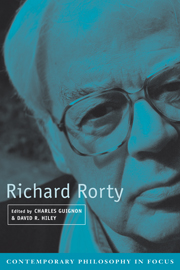Book contents
- Frontmatter
- Contents
- Contributors
- Acknowledgments
- Abbreviations
- Richard Rorty
- 1 Introduction: Richard Rorty and Contemporary Philosophy
- 2 Rorty's Critique of Epistemology
- 3 Rorty on Knowledge and Truth
- 4 From Realism or Antirealism to Science as Solidarity
- 5 Rorty's Democratic Hermeneutics
- 6 Rorty's Inspirational Liberalism
- 7 Don't Be Cruel: Reflections on Rortyan Liberalism
- 8 Rorty and Philosophy
- Bibliography
- Index
3 - Rorty on Knowledge and Truth
Published online by Cambridge University Press: 18 December 2009
- Frontmatter
- Contents
- Contributors
- Acknowledgments
- Abbreviations
- Richard Rorty
- 1 Introduction: Richard Rorty and Contemporary Philosophy
- 2 Rorty's Critique of Epistemology
- 3 Rorty on Knowledge and Truth
- 4 From Realism or Antirealism to Science as Solidarity
- 5 Rorty's Democratic Hermeneutics
- 6 Rorty's Inspirational Liberalism
- 7 Don't Be Cruel: Reflections on Rortyan Liberalism
- 8 Rorty and Philosophy
- Bibliography
- Index
Summary
Richard Rorty is notorious for announcing – indeed, celebrating – the death of philosophy. Rorty has not always been happy with the label “death-of-philosophy theorist.” As he sees it, the works of those writers we consider great philosophers are likely to be read as long as there are readers. The object of his critical attention is something narrower: philosophy as it is understood and practiced in mainstream Anglo-American philosophy departments. Philosophy of this kind is supposed to deal with a range of distinctively philosophical problems and thus to have a special subject matter. Familiar examples of philosophical problems are the nature of knowledge, the mind–body problem, and the question of whether moral values are objective. Philosophers also used to suppose that philosophy had not just distinctive problems but also special methods – for example, that philosophical inquiry was conceptual rather than empirical – though today this is an issue about which there is no consensus. In truth, the consensus on what problems are philosophical (or whether there is anything distinctive about the problems that get called “philosophical”) is also far from complete. Such developments do not surprise Rorty, who thinks that “analytic philosophy” is more a way of picking out a sociological group than a description of an intellectually coherent movement. Rorty thinks that his account of the inner logic of the analytic movement in philosophy has been confirmed by events.
- Type
- Chapter
- Information
- Richard Rorty , pp. 61 - 80Publisher: Cambridge University PressPrint publication year: 2003
- 9
- Cited by

